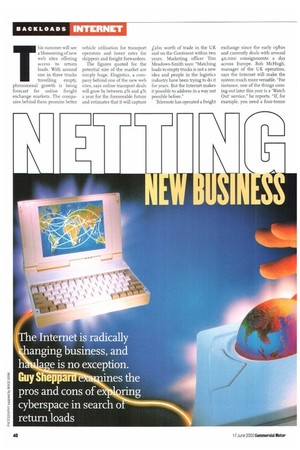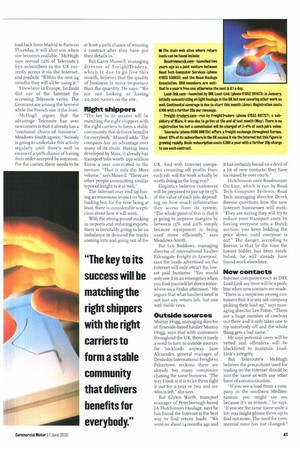e Internet is radically anging business, and h a e is no exception.
Page 42

Page 43

If you've noticed an error in this article please click here to report it so we can fix it.
Guy Sheppar e ines the
pros and cons of e ring cyberspace in search o return loads
This summer will see a blossoming of new web sites offering access to return loads. With around one in three trucks
travelling empty, phenomenal growth is being forecast for online freight exchange markets. The companies behind them promise better vehicle utilisation for transport operators and lower rates for shippers and freight forwarders, The figures quoted for the potential size of the market are simply huge. Elogistics, a company behind one of the new web sites, says online transport deals will grow by between 2% and 4% a year for the foreseeable future and estimates that it will capture i2bn worth of trade in the UK and on the Continent within two years. Marketing officer Tim Meadows-Smith says: "Matching loads to empty trucks is not a new idea and people in the logistics industry have been trying to do it for years. But the Internet makes it possible to address in a way not possible before."
Teleroute has operated a freight exchange since the early 198os and currently deals with around 40,000 consignments a day across Europe. Rob McHugh, manager of the UK operation, says the Internet will make the system much more versatile. For instance, one of the things coming out later this year is a 'Watch Out' service," he reports. "If, for example, you need a four-tonne load back from Madrid to Paris on Thursday, it will alert you when one becomes available." McHugh says around 12% of Teleroute's 650 subscribers in the UK currently access it via the Internet, and predicts: "Within the next 24 months they will all be using it."
Elsewhere in Europe, he finds that use of the Internet for accessing Teleroute varies. The Germans are among the keenest while the French use it the least.
McHugh argues that the advantage Teleroute has over newcomers is that it already has a "continual churn of business". Meadows-Smith agrees: "Nobody is going to undertake this activity regularly until there's well in excess of a 90% chance of having their order accepted by someone. For the carrier, there needs to be at least a 20% chance of winning a contract after they have put their details in."
But Garry Mansell, managing director of FreightTraders, which is due to go live this month, believes that the quality of business is more important than the quantity. He says: "We are not looking at having 20,000 names on the site.
Right shippers
"The key to its success will be matching the right shippers with the right carriers to form a stable community that delivers benefits for everybody," Mansell adds. The company has an advantage over many of its rivals. Having been developed by Mars, it already has transport jobs worth 250 million Euros a year committed to the venture. "That is only the Mars volume," says Mansell. "There are other people committing similar types of freight to it as well."
The Internet may end up having an enormous impact on backloading but, for the time being at least, there is considerable scepticism about how it will work.
With the strong pound sucking in imports and reducing exports, there is inevitably going to be an imbalance in demand for trucks coming into and going out of the
UK. And with Internet companies creaming off profits from each job, will the work actually be worth doing in the long run?
Elogistics believes customers will be prepared to pay up to 15% of the value of each job, depending on how much information they access from its system. "The whole point of this is that it is going to improve margins by between 15% and 20% simply because equipment is being used more efficiently," says Meadows-Smith.
But Len Beddows, managing director of international haulier Falcongate Freight in Liverpool, says the loads advertised on the Internet will only attract the lowest paid business: "You would only use it in an emergency when you find yourself let down somewhere on a Friday afternoon." He argues that what hauliers need is not just any return job, but one with viable rates.
Outside sources
Murray Hogg, managing director of Tyneside-based haulier Murray Hogg, says that with customers throughout the UK, there is rarely a need to turn to outside sources for backloads anyway. Jane Alexander, general manager of Denholm International Freight in Felixstowe, reckons there are already too many companies chasing the same business. "The way I look at it is to let them fight it out for a year or two and see who is left," she says.
But Glywn Warth, transport manager of Peterborough-based JA Hutchinson Haulage, says he has found the Internet is the best way to find return loads: "We went on about 14 months ago and it has certainly found us a devil of a lot of new contacts; they have increased by over t00%."
Hutchinson uses Roadrunner On Line, which is run by Road Tech Computer Systems. Road Tech managing director Derek Beevor questions how the new Internet businesses will work: "They are saying they will try to reduce your transport costs by forcing everyone into a Dutch auction; you keep bidding the price down until everyone is out." The danger, according to Beevor, is that by the time the lowest bidder has been established, he will already have found work elsewhere.
New contacts
Internet companies such as DRL Load-Link say trust will be a problem when new contacts are made. "There is a suspicion among customers that it is any old company picking their load up," says managing director Les Paton. "There are a huge number of cowboys out there and it only takes one to rip somebody off and the whole thing gets a bad name."
He says potential users will be vetted and offenders will be blacklisted to maintain LoadLink's integrity.
But Teleroute's McHugh believes the precautions used for trading on the Internet should be just the same as with any other form of communication.
"If you see a load from a company in the southern Mediterranean, you might say no, because it's so remote," he says. "If you see the same name quite a lot, you might phone them up to find out more. The need for commercial nous has not changed."








































































































